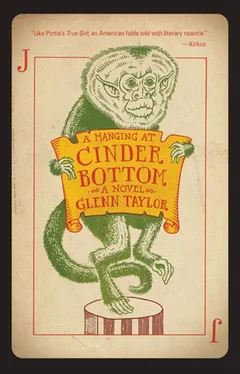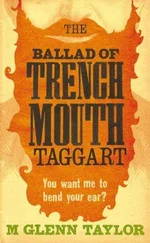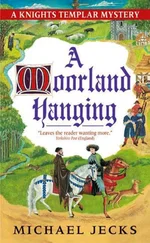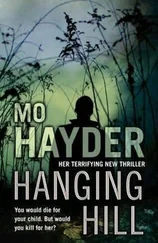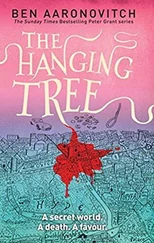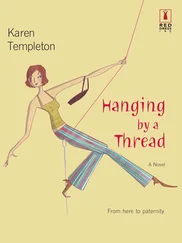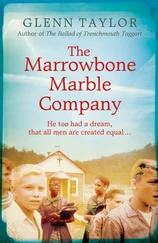A heavy tarpaulin covered what had been the little stage. Beneath it was the stopped progress of Jake’s skilled carpentry, a cobwebbed affair of grandiose intent. A plan never realized.
From the storage room in back, there came the sound of breaking glass and mumbled cursing. A moment passed, the swinging door kicked free, and a young man stepped through it carrying a five-gallon kerosene can in one hand and a jug of whiskey in the other. He was tall and thin and he wore an uneven beard. “You two better sip it slow,” he said to the men at the bar. “I broke one gettin it off the high shelf.” Then he saw Abe standing there.
“Hello Samuel,” Abe said.
Sam Baach had grown hard and wiry and his teeth wore the stain of all that he put to his lips and swallowed. His nose had been broken. He had a voice like an old man.
He set the kerosene can and bottle on the bar top. His mouth went dry. There was a tingle at the backs of his knees. “Abe?” he said.
The men at the bar frowned and traded a look. They had heard the name.
He took off his hat and left his luggage where it lay. His strides toward Sam were long and he spread his arms wide on the way. It was an embrace known only to brothers. Abe cracked a couple of vertebrae when he squeezed. “Boy, you are a pawpaw knocker aren’t you?”
“No taller than when you last saw me,” Sam said. They stepped back from each other and cocked their heads and beheld. Sam was the first to look away.
The men at the bar looked at one other again and nodded. It was, in fact, who they thought it was, and though they’d lived in Keystone only two years, they had heard tell of the man, and they’d suspected, as most did, that Abraham Baach would not ever come home.
He took a seat at the bar and turned on his stool to face the two men. “Afternoon,” he said.
They nodded. The tall man was missing an eye. The short one wore his weight funny and had a chest like a woman’s.
Sam chewed his lip and attempted to regulate his breathing.
Abe smiled as he took a small cigar from his pocket and held it up between thumb and fingers. He put the end of it in his ear and pushed, and when it was all the way in, he stuck his finger inside the canal and pushed some more. Then he coughed and pulled the cigar from his lips.
The short man sneezed and shook his head. He’d seen some things, but he’d not ever seen a man stick a cigar in his ear and pull it out his mouth.
“So you the Abe Baach they speak on?” the tall man asked.
Abe smiled. He regarded the pinched hole where the man’s eye had once resided, a belly button now, empty at the center. He said, “If they speak on a man with testes spiked like sweet gum seeds, then yes, I reckon I am one and the same.”
The tall man laughed. The other was not possessed of an imaginative humor.
Abe closed his fist upon the little cigar. There was a faint sound of paper tearing. “You gentlemen look to be making the notable move from ale to whiskey,” Abe said. “I wonder if you’d mind relocating to another establishment so my brother and I might visit awhile.” He opened his fist, and in it were two Morgan silver dollars. He slapped the coins on the bar top and pushed them forward.
“Wouldn’t mind at’all,” the tall man answered, and he examined his coin before pocketing it.
“I wonder too,” Abe said, “if you’d mind sparing folks mention of my arrival. It would be premature to speak on it just yet.”
Both men nodded. “Lips are sealed,” the tall man said. He’d rightly noted a vague danger should they break their word.
“I’m obliged to you,” Abe said.
They slid from their stools and walked out the door so that for a moment, sunlight lit the place, and Abe listened close to the croak of the rusty spring and the slap of the wooden screen door when it shut. It was a sound he could listen to all day.
Sam had a shiver about him. He pulled at his beard and watched his older brother. “Jake alive?” Abe asked.
“As of this morning, yes, but not by much.”
“What happened to him?”
“Shot. One in the chest, one in the belly, a graze at the neck.” He pointed to the spots on himself as he spoke of them. “One of em still in there. Doctor Warble said blood poisoning.”
The door sounded again and Abe hid himself by putting his hand to his face as if dozing.
Sam squinted to be sure of the patron’s identity. “How do Chesh,” he said. Then he gestured to hold up. “Come back in ten minutes.”
Before the young man nodded and left, he sized up the fellow hiding his face at the bar.
“Who was it?” Abe said.
“Nobody.”
Nobody was Cheshire Whitt, son of councilman J. T. Whitt, owner of the McDowell Times and founder of the Negro Presbyterian Church. Cheshire was the only Whitt to associate regularly with folks in the Bottom, and his father did not like it, for he believed the black man would only make his mark by honest means.
Abe said, “Who shot Jake?”
“Italian fella, name of Dallara. Carpenter. Two of em was thick as glue.” Sam cleared his throat. “Happened up on Buzzard Branch Saturday last. Early evenin, three shots. Jake run out of the woods hollerin and carryin on, blood all over. One of the girls from Fat Ruth’s seen him, but he was on the ground time we got to him. Never been awake since. He won’t just die like most.”
“The carpenter?”
“Captured up at Matewan. They’re keeping him up there in the jail. Rutherford’s one that caught him, tracked him to a hideout up some hollow. Rifle was up on Buzzard Branch, three rounds spent.”
“Where is Jake now?”
“Up at the house.”
“I reckon I’ll head up there.” Abe stared at the wall for a moment, then shook his head.
Sam’s nerves were getting the better of him. It was as if a ghost had walked in the door. He set out two glasses, poured for Abe and then himself, and they held them up and drank them down. He wanted to ask about the scar, but he couldn’t think of how. He regarded the fine clothes of his older brother. He said, “Jake was setting right there on your stool back in January when he got religion.”
“How’s that?”
“He had a vision, and afterwards, he’d tell anybody that listened all about it.” He shook his head and pointed to Abe’s stool. “Happened right there,” he said. “He didn’t take a drink since.”
“How do you mean?”
And Sam told how he meant.
On January 23rd, Jake Baach had the vision that changed his path. It was a Sunday. He’d been drinking whiskey all morning. There was no discerning why the one particular slug was different than those before it, but it was. It went down the wrong pipe, and Jake was choked. He drew no air. His eyes popped. And in the darkness that overtook the inside of his head, a purplish cloud awakened. It pulsed and grew and from it erupted roots and limbs and spewed clods of dirt dried and wetted both, and everywhere there hung the shed skin of reptiles. And the shed skins agitated and moved as if they still held life and they sought each other’s touch and they twisted and went end to end on the black dirt ground and made of themselves a scroll of words which Jake could not distinguish, but still he knew with certainty from whence the words came, and if he drew another breath, he would be indebted to the God he’d never believed in.
And he did finally draw another breath, and when he came to on the floor with Sam patting his back, he said, “I’ve had a vision,” and he told Sam of it in great detail, and directly he went to see Mayor Trent, who was himself slugging whiskey on the Sabbath at his own establishment.
Jake had addressed him as Mr. Mayor, which was peculiar, first because he’d only ever addressed the man as Mr. Trent, and second because his voice had changed. It was a full octave deeper. He’d asked if they could be alone.
Читать дальше
Конец ознакомительного отрывка
Купить книгу
